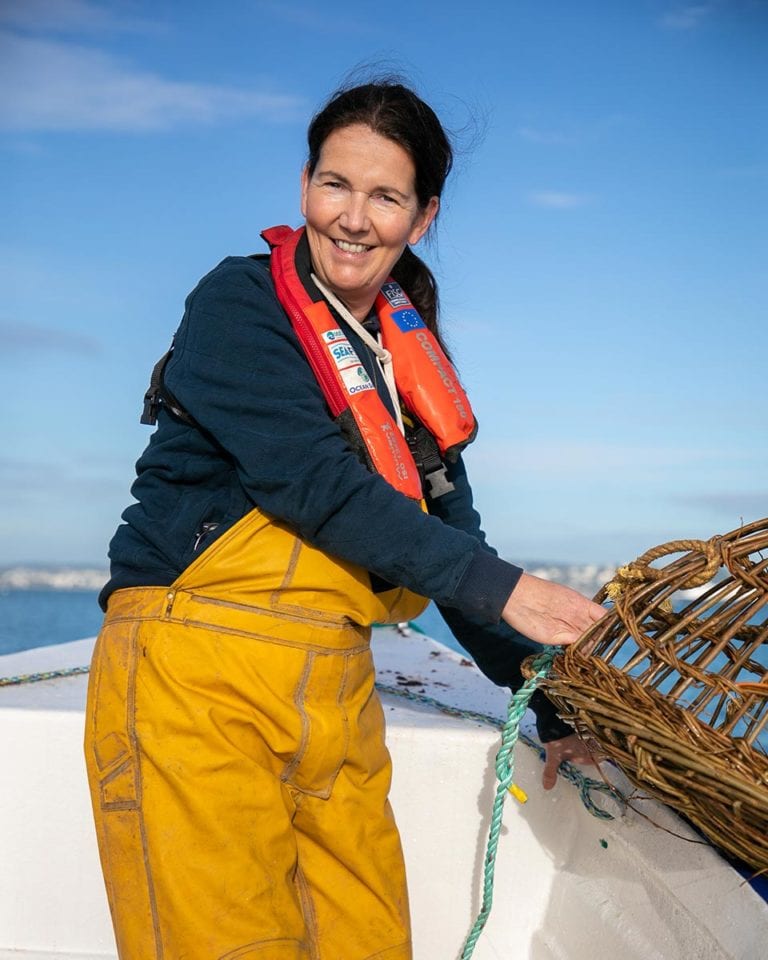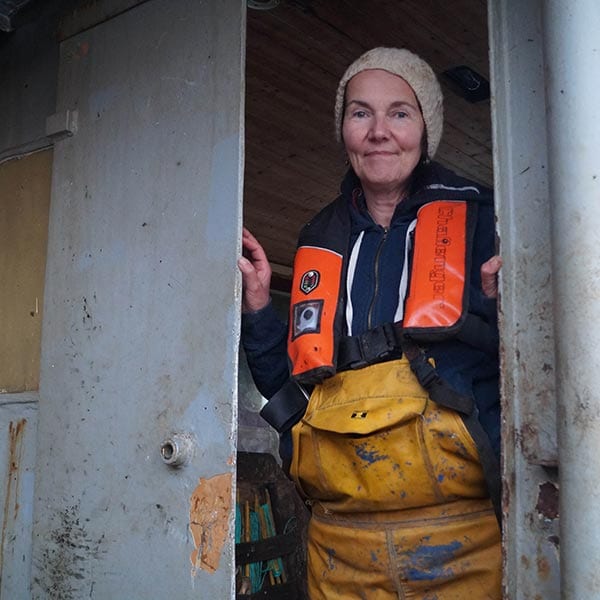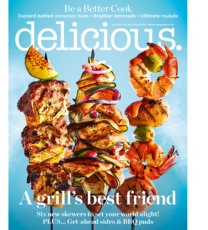Food job diaries: a day in the life of a female ‘fisherman’
If there’s one job that poses danger on a daily basis, it’s fishing. From rocky seas and bad weather to a lack of basic toilet facilities, there are unique daily challenges to this line of work.
We caught up with two female skippers, Sarah Ready and Ashley (AKA The Female Fisherman) whose love for all things fishing led them to become full-time fisherwomen. If you’ve ever wondered what it’s like to be a female skipper in the hugely male dominated fishing industry, read on.

Sarah Ready AKA Girly Fisherman
Tell us about your role. How long have you been working in the industry?
My job title is Voluntary Welfare Administrator at New Under Ten Fishermen’s Association. I am a fishwife, fishmother and fisherwoman. I have been with my husband for over 30 years and have been a fishwife during the entire time. Our sons are 21 and 19 and I used to fish with my husband for 10 years before our children came along. For the last 20 years, we decided not to fish together, as it’s so dangerous with young children. But we have returned to fishing together now the children are adults.
From waking up to going to bed, what does your average day at work look like?
It’s a 4.30am start. We go like the clappers all day, often on choppy seas and bad weather, until around 5.30pm at night. We do not have toilet facilities other than a bucket. There is only a kettle by way of cooking – it’s porridge with hot water over, cuppa soup etc. Very basic facilities. I often fall off my bucket if the weather is really bad and the seas are choppy.
What’s the boat like? How many people are you in charge of?
The boat is a small under 10m vessel. It’s very old and went into service in 1979, it has little by way of mod cons and creature comforts. It’s just the two of us on board, myself and my husband.

Do you know other women with the same job as you?
None. Only me. I am an ex-lawyer in fisheries litigation and very entrenched in fishing and all aspects of the industry. I am Company Director of our fishing business and also administrator at NUTFA. I eat, sleep and breathe fishing.
Is it a tough job?
It is a way of life rather than a job. Most jobs are stressful but fishing is dangerous. We love fishing as a family, and it has been both harsh and kind in equal measures.
Why do you think it’s rarer to see women working on fishing boats? Are there any misconceptions about the job?
The weather is harsh and it is only tougher women who are very practical that can cope with the everyday issues of fishing. It is not for the faint-hearted and thankfully I have never been sea sick. I cannot think of anything better than sharing a day with a partner, both doing a job that you both love. It is splendid on a day when the weather is good, but can be grim when there are no fish, on choppy seas, in miserable weather. You take the good with the bad.
In the last few years would you say there are more, less or roughly the same number of women in the trade?
About the same I think. Most women would not want the 4.30am start and the 5.30pm finish with no toilet facilities, or the ability to take a break. It is a harsh environment but you do not really think about women or men in the industry. There are just those who fish.
What’s the best thing about the job? And the worst?
Best is keeping your own hours, no two days are the same, the excitement of ‘will we catch anything?’. The worst is going many months with no income when there are no fish, prices being poor or boat repairs scuppering days at sea.
How did you get started in this line of work?
I grew up in a seafaring family. I was never going to marry someone who worked 9 to 5. I love every aspect of the fishing industry, which has, on the whole, been kind to me. If you work hard, stay focused, and love the job, you can still earn a living. But it is a tough existence. I would rather be broke doing this, loving what I do, than earn a higher income in a 9 to 5 job. It is what you get used to and what you are prepared to put up with.
Would you recommend the job to other young women?
Oh-my-days, definitely. If you are not looking to be materialistic, and you want a job that you love, commanding your own hours, with no two days the same, in all the elements, this is the job for you. Be prepared to banter on the quay with no male or female identity. We are all fishers and the male/female aspect goes out of the window if you are good at what you do within the industry. It is just a case of commanding acceptance – the males realise that you can hold your own.
What personal qualities do you need to thrive in this working environment?
You need a thick skin, a sense of self-confidence, a belief that you can do whatever life and the job throws at you, and a desire to catch as much as you can, in all difficulties. I have loved being entrenched within the fishing industry for over three decades and cannot imagine retiring. It is a privilege to be out there on the water on a lovely day, with the fish are coming in, with my husband, on calm seas, in the sun. These days are few and far between – but the other days can be good too. If you are prepared to tough it out and look to the next season of fishing with hope. You need a level of optimism the day after catching nothing the day before…

Has Brexit had any impact on your work?
Brexit was hell, because the prices slumped before the end of December. If we cannot sell our catch to the EU then the fish just sit unsold. This causes a glut in the UK, pulling down all prices, including those destined for the UK market, as there is such a lot of fish sitting in the UK. It is a case of supply and demand. Some species are only bought by the EU because as a nation we do not eat fish such as squid etc which is very popular in Europe, but not here. We have stopped being able to land fish destined for Europe and thank goodness for Pesky where the majority of fish are being sold in the UK retail market. The problems in Europe have reduced prices both in UK and beyond.
What challenges has the pandemic presented for you?
It has been a positive in that the UK have at last recognised the need to support our UK fishermen. There is a new level of desire to buy British, and buy fish from small scale fishermen. This enthusiasm is fantastic and we have embraced this through Pesky to get better prices for our fish. We have a direct relationship with our consumers at last, who are interested in where fish comes from, who is catching it, how it is caught, and the transparency of the supply route.
"You need a thick skin, a sense of self-confidence, a belief that you can do whatever life and the job throws at you, and a desire to catch as much as you can."
Ashley Mullenger, also known as The Female Fisherman on Instagram
Tell us about what your job involves.
So, we have two boats, Fairlass and Saoirse, they are a joint enterprise for myself and Nigel, who is a long-standing friend and in charge of everything operational. He deals with mechanics, day-to-day fishing operations and he’s the skipper. I am merely the business admin, accounts, marketing, sales, spanner girl, oh and full-time deck hand.
From waking up to going to bed, what does your average day at work look like?
My day-to-day varies as I work from a tidal harbour, so the time I start my day will depend entirely on the tide. Sometimes I could be setting an alarm for 07:00, but sometimes its 23:00. But the routine is normally the same, it will involve rocking up at the boat at the given time, carrying out engine checks, loading up bait (if we didn’t do it the day before) checking we have enough fish boxes, firing the old girl up, un-tying and leaving the harbour. For now, we fish with mainly whelk pots, so we will decide which group of gear we will be going to haul that day and head there. Sometimes it might be a quick steam to the fishing grounds but other times it could be a couple of hours. We usually set the deck up and cut bait on the way out so we are ready to go when we arrive at the first string of pots. Each string of pots contains around 50 pots and is around half a mile long. We will look to haul anything between 7-10 strings in a day.
Tell us about hauling…
Because our harbour is tidal, there is a time pressure to make sure we get all the gear done that we want to in order to make it back in on the next tide. If some of your pots come up tangled, this all costs valuable time. Each pot is hauled up on a hydraulic winch, manually shook empty on a size grading table called a riddle, it is then baited and stacked in order and then shot back to the sea bed ready for the next day we check them. Once back in the harbour, we unload, and usually a lorry will collect our catch and lift them off with a crane. We also get our bait from the processors who collect our catch, so this will be loaded up too. And if we need to diesel the boat up then we will usually do this either at the start or the end of the day. Then it’s landing paperwork for the authorities, eating, washing and sleeping… the day can be anything from 12-16 hours long.
What’s the boat like? How many people are you in charge of?
Well I’m biased because I think that both our boats are beautiful. Fairlass is an 11m wooden hulled Scottish boat, built in the 1970s, and Saoirse is a slightly more modern boat, built in the late 80s, which is 8 metres long and fibreglass. I have no authority over people, and I don’t want any! Nige (my skipper) and I work as a team. He is the one ultimately responsible for everybody’s safety and the business decisions we make between us.
Do you know other women with the same job as you?
So I’ve been trying to keep a log of all the women that I know of who are working on boats. Some are more active that others; some are full time, some work with family and do various different types of fishing, some are potting, some are trawling and doing various other types of fishing. I think I’ve managed to track down about 10 of us in total, from various corners of the country.
Is it a tough job?
Yes and no. It can be hard work physically, but it’s a stamina job, not a sprint. The weather can be a challenge, on the days when it’s rough, your body works harder to stay upright without you being consciously aware of it. There is a lot of heavy boxes in this job. But your body soon builds the strength required to deal with it. Sometimes it can be mentally hard work, if the fishing is poor or the weather seems dead against you for days on end. It’s a very honest job – if you don’t catch, you don’t earn.
Why do you think it’s rarer to see women working on fishing boats? Are there any misconceptions about the job?
I have been tossing this around in my head for a while. I was baiting and stacking pots the other day and I was really thinking about it, it was one of those rare, still-sunny, cold and crisp January days on the North Sea. Maybe it’s the climate, the thought of long days in the cold, exposed to the elements? Maybe women lack the confidence to step into a predominantly male industry? Women make up 2% of the fisheries sector here in the UK. I do wonder if being cut off from the land is a big deal breaker for women – especially if they have a family and need to be around for their children. I also don’t mind sharing that we don’t have a toilet on our boats, so its a quick bop on the deck as nature calls. But I will finish by saying that most men in this industry I have met have been supportive and welcoming and never made any comments that have made me feel unwelcome in the job.
In the last few years would you say there are more, less or roughly the same number of women in the trade?
That’s a tough one. I wasn’t involved in social media until about 18 months ago… but now I’ve started looking for them, I seem to have found them. Before that, I was only really aware of one other.
What’s the best thing about the job? And the worst?
I love it all, all the menial tasks, the maintenance, the bad weather and bad fishing days. Without those days I wouldn’t appreciate the good days when it’s flat, calm, hot and the fishing’s good. There are some spectacles of nature that you are privileged to be around – dolphins never fail to make me cry because they actively swim to the boat and stick with you like they want to be near you. Sunrises and sunsets, clear starry skies on dark nights and daylight breaking at about 3am in the summer over the sea.
How did you get started in this line of work?
I’ve been a commercial fisherman for around 2 and half years now. I fell in love with being at sea around 12 years ago on a charter angling trip. We were on a boat called Sunbeam 3, operated by Nigel, who is now my business partner as we own 2 boats between us. On my Instagram, I have a Story Highlight called My story which has the full story and pictures of how I found myself here. The long and short of it is Nigel just couldn’t get rid of me, and I worked on the charter boat with him on weekends, juggling annual leave from my office job, until he sold up and bought a commercial fishing boat. We always kept in touch, until one day he said “come back!”. The rest is history.
Would you recommend the job to other young women?
Yes, if you like being outdoors and a physical job appeals, then I’d recommend it to any young person. I think you need to posses great patience and listening skills. I don’t think I’ve met a skipper that doesn’t have a fire within them and determination. A sense of humour is essential and the ability to be resilient on the days when things don’t go as planned.
Has Brexit had any impact on your work?
Not so much – our processors required a food registry number in order to export and luckily I had already done this. I don’t know yet what Brexit will mean for the industry as a whole, and what knock-on effect it may have to us as we fish for non-quota species.
What challenges has the pandemic presented for you?
We were worried that the factories may close and exports be stopped. Luckily that didn’t happen, but the prices dropped and still have not fully recovered. The price of bait did not drop in line with the price drop for our catch, and we have also found that many fisherman stayed whelking for longer, rather than going crabbing because there was no market for crab.
Follow Sarah and Ashley on Instagram. And you can buy their catches via Pesky.
Subscribe to our magazine
Food stories, skills and tested recipes, straight to your door... Enjoy 5 issues for just £5 with our special introductory offer.
Subscribe
Unleash your inner chef
Looking for inspiration? Receive the latest recipes with our newsletter